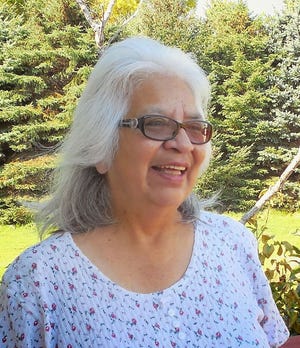GREEN BAY – So much of what we know about the time in the 1800s when First Nations ceded their lands in Wisconsin is told from non-Indigenous perspectives, but Dr. Carol Cornelius is aiming to change that.
Cornelius is writing a book that will be published by the Wisconsin Historical Society next year focusing on the writings of Indigenous leaders of the time. It has a working title of “History of Indigenous Voices During the Removal Era.”
“We need to do this from the Indigenous perspective,” Cornelius, a citizen of the Oneida Nation said. “There are other histories, but that’s not the same as coming through our voices.”
Much of her information comes from extensive research of the letters Indigenous leaders in Wisconsin wrote to each other and the U.S. government.
“This is what our elders were saying during the treaty negotiations,” Cornelius said. “It’s just finding those (letters), because they’re hidden.”

She said there were “all kinds of controversies” over what First Nations leaders thought they were agreeing to and what treaties were considered valid.
“The Menominee and the Ho-Chunk believed they were agreeing to share the land, not sell it,” Cornelius said.
Other treaties were considered unratified because they were between Indigenous nations, but Cornelius said they still should be considered valid to the U.S. government because they were signed by the president.
Cornelius lays out how these treaties took Indigenous lands in Wisconsin piece by piece from the Menominee, Ojibwe, Ho-Chunk, Lakota and Potawatomi.
She also discusses the “New York Indians” of Oneida, Stockbridge-Munsee Mohicans and Brothertown Indians who were forced to move to Wisconsin from the New York area in the first half of the 19th century.
The Menominee Nation had eventually agreed to share 500,000 acres with the “New York Indians,” but that was significantly whittled down, as well, in cession to the U.S.
Cornelius said First Nations leaders agreed to treaties that took land from them under threat of forced removal or removal of food aid and other essentials.
“They wanted to move us to Oklahoma,” she said.
The Treaty of 1838 had secured the Oneida Nation’s 65,400-acre reservation, which is still in place today, as has been affirmed by recent federal court rulings.
Cornelius will discuss this history through a presentation at the Brown County Public Library, 515 Pine St., in downtown Green Bay, at 6:30 p.m. Sept. 22.
The presentation is part of the library’s Local History Series on Thursday evenings.
Cornelius will display maps showing ancestral Indigenous lands in Wisconsin and how that land was carved away through treaties.
Cornelius earned her Ph.D. at Cornell University in 1992 and helped build the First Nations Studies undergraduate program at the University of Wisconsin-Green Bay, where she still teaches.
Source: Native American removal in Wisconsin focus of book by Oneida historian

